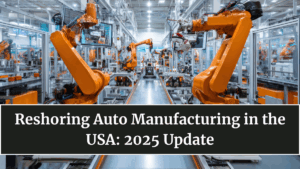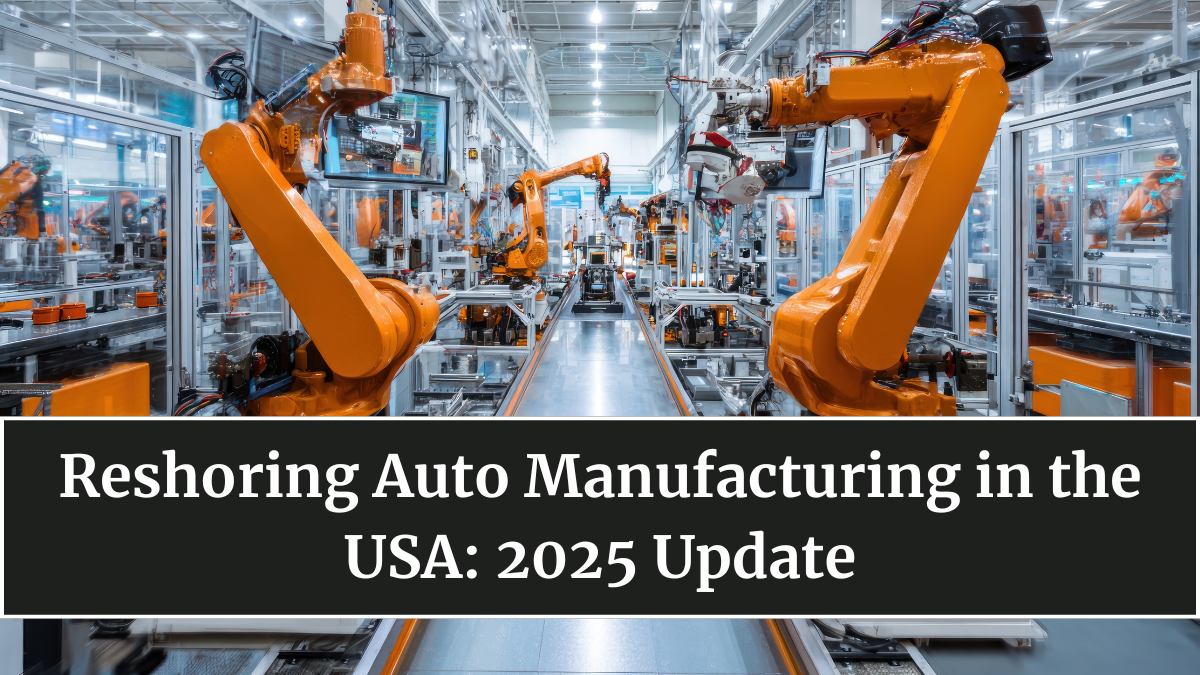America’s automotive industry is coming home. The USA auto plant reshoring 2025 wave marks a powerful shift as manufacturers move production back from overseas to U.S. soil. Once driven by the allure of cheaper labor abroad, automakers are now prioritizing resilience, supply chain control, and sustainability. From Michigan to Texas, new plants are reshaping the future of American manufacturing — with electric vehicles (EVs), automation, and local jobs leading the charge.

Why Automakers Are Bringing Production Back
The COVID-19 pandemic exposed the risks of overdependence on global supply chains. Shortages of semiconductors, raw materials, and logistics bottlenecks disrupted car production worldwide. For U.S. automakers, this was a wake-up call. Reshoring production offers greater control over supply, faster response times, and reduced vulnerability to international disruptions.
Beyond crisis recovery, policy incentives have also made domestic production more attractive. The Inflation Reduction Act (IRA) and CHIPS and Science Act have encouraged investments in American battery plants, semiconductor fabs, and EV assembly lines — signaling a strong government commitment to local industry revival.
Key Players Leading the Reshoring Movement
Several automakers have already taken major steps to establish or expand production in the U.S.:
| Company | Project | Location | Investment | Focus Area |
|---|---|---|---|---|
| Ford Motor Co. | BlueOval City | Tennessee | $11.4 billion | EVs and batteries |
| General Motors | Factory ZERO | Michigan | $7 billion | EV trucks and battery assembly |
| Tesla | Gigafactory Texas | Austin, TX | $10 billion+ | Vehicles and battery packs |
| Hyundai-Kia | EV & Battery Plant | Georgia | $7.6 billion | EV manufacturing |
| Toyota | Battery Plant | North Carolina | $13.9 billion | Battery cells and modules |
These investments demonstrate how reshoring is no longer just a patriotic move — it’s a strategic necessity for global competitiveness.
Economic and Employment Impact
Reshoring is not just about factories — it’s about people. The auto industry revival is creating thousands of high-tech jobs in manufacturing, logistics, and renewable energy. Local economies in states like Ohio, Kentucky, and Tennessee are benefiting from a new wave of industrial growth.
Experts estimate that by 2026, over 100,000 new jobs will be created in the U.S. auto sector through EV and battery-related projects alone. This transition also supports local suppliers and small manufacturers who are part of the broader value chain, strengthening the entire industrial ecosystem.
Challenges in the Reshoring Process
While reshoring brings optimism, it also faces obstacles. Setting up new plants in the U.S. is costlier than in Asia, and skilled labor shortages remain a challenge. Automakers must balance wage competitiveness with advanced training to meet the needs of modern, automated factories.
Another hurdle is the battery material supply chain — much of it still depends on imports from countries like China, Chile, and Indonesia. To counter this, U.S. companies are exploring domestic mining, recycling, and partnerships to secure critical raw materials for EV production.
The Role of Technology & Automation
Reshored plants in 2025 look very different from traditional factories. They are powered by AI-driven robotics, IoT systems, and predictive analytics that improve efficiency and reduce waste. Smart manufacturing ensures precision, lower downtime, and sustainability through energy optimization.
This wave of Industry 4.0 integration is turning American auto manufacturing into a model of innovation — where technology and sustainability coexist.
The Road Ahead for U.S. Auto Manufacturing
The reshoring of automotive manufacturing is more than just a relocation trend — it’s a long-term transformation. As the U.S. strengthens its domestic supply chain and EV infrastructure, automakers will enjoy greater resilience and global influence.
Analysts believe that by 2030, America could re-emerge as one of the world’s top automotive production hubs. With renewed focus on clean energy, digital automation, and skilled employment, reshoring isn’t just reviving an industry — it’s redefining it for the future.
FAQs
What is reshoring in the auto industry?
Reshoring refers to manufacturers bringing production and assembly operations back to the U.S. from overseas, strengthening local supply chains.
Why are automakers reshoring now?
The pandemic exposed supply chain weaknesses. Combined with U.S. government incentives, reshoring provides stability, local jobs, and greater control.
Which companies are leading U.S. reshoring?
Ford, GM, Tesla, Toyota, Hyundai, and Kia are among the major automakers investing billions in U.S.-based factories.
How will reshoring affect consumers?
Reshoring can lead to more reliable vehicle availability, potentially shorter delivery times, and growing access to locally made EVs.
Is reshoring sustainable in the long run?
Yes. With automation, renewable energy use, and government support, reshoring is designed to be economically and environmentally sustainable.
Click here to know more.
